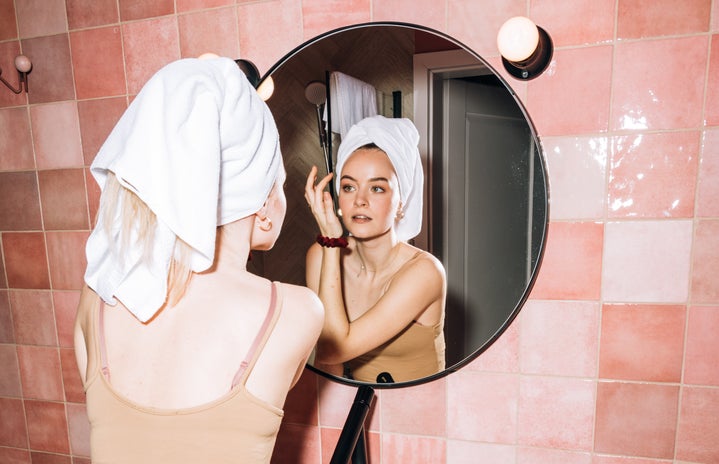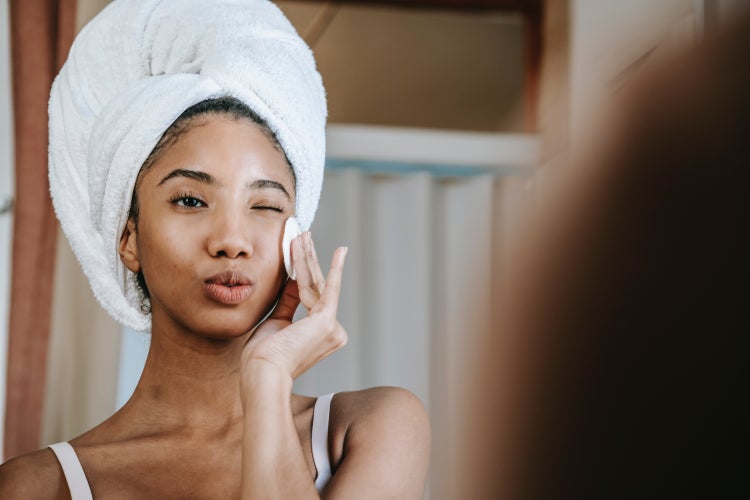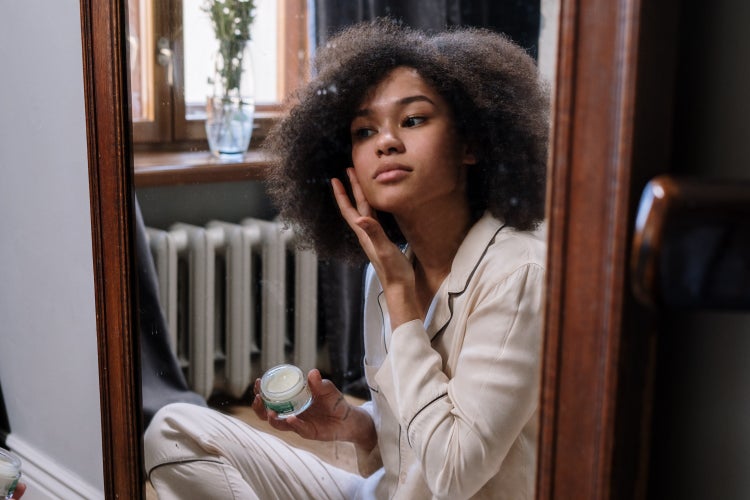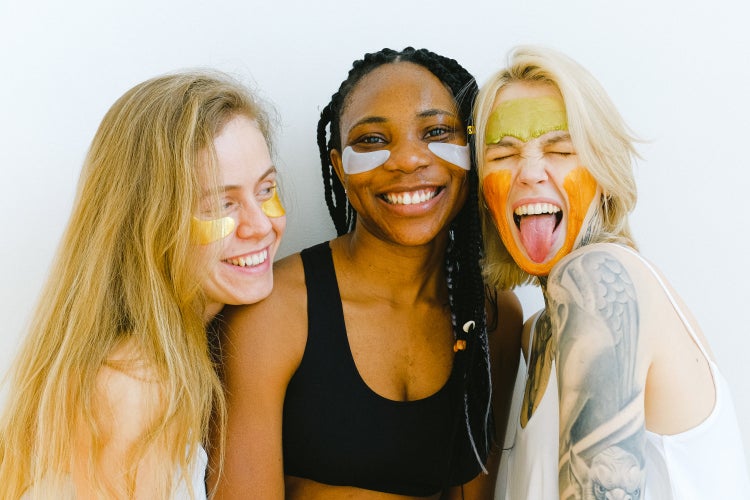You asked for it, and we delivered. Here’s a no b.s., comprehensive guide on how to care for your skin type.
Dry
If you step out of the shower (remember to avoid long, hot showers!) and immediately feel a tightness in your skin, there’s a high chance you suffer from dry skin like I do.
Do I Have Dry Or Dehydrated Skin?
First, we have to differentiate dry and dehydrated skin. Dehydrated skin can happen with any skin type, oily or combination, and the problem lies with insufficient moisture within the skin ‘matrix’. This is resolvable with the less exposure to the sun and drying AC, and proper skincare. Dry skin, however, is pretty much forever. You can only cure your woes temporarily with skincare or treatments!
Your #1 bestie in ridding rough patches of dead skin and flakes? Exfoliators. Done right, using these 2-3 times a week will leave you with smoother, softer skin, but it poses the risk of skin irritation (redness, sudden bouts of breakouts, et cetera).
Exfoliators: Is Physical Or Chemical For Me?
There are two kinds of exfoliators in the general skin care market, physical and chemical exfoliators. Physical ones often contain granules to slough off dead skin and come in a tube or jar that you can buy from your nearest drugstore. Many dermatologists disclaim this though, as these granules (however they’re marketed) scratch and damage the delicate skin layer, leaving it prone to wrinkles and photodamage. If you experience the worsening of acne after scrubbing your skin, it’s likely that these granules spread the bacteria from the active breakouts to other parts of your face.
Instead, try chemical versions that contain gentle acids like AHA or BHAs that do way less damage to your skin. It dissolves the dead skin on the surface and leaves the rest unharmed. Learn from my mistakes and refrain from exfoliating more than thrice a week to avoid overstimulation! I now only do it once a week, or when I feel a buildup of dead skin.
What else should I note?
Here’s the most important part to exfoliation, particularly with chemical ones: layer up the SPF the morning after to avoid getting burnt, as acids make your skin weaker and more sensitive for the next few hours.
Follow up exfoliation with your favourite moisturizer! Look out for words like “natural moisturizing factors” (or “NMF”s), “ceramides” and “hyaluronic acid” (please do your skin a favour and layer your fave moisturizer over this) while shopping.
Tip: Also, avoid any kind of products with drying agents like laureth sulfate! These are found in many shampoos or soaps that have intense lather to it.
Recs: Pyungkangyul Intense Moisture Cream, Mediheal N.M.F sheet masks (bro i love these), COSRX Daily Pimple Pads
Sensitive
If there was a Grinch of skin types, this would be it. The keyword to counter this skin type is minimalism. Whether you have oily skin or dry skin along with it, try finding gentle, dermatologist recommended formulas. Brands like Avene, La Roche Posay, Innisfree’s The Minimal line and Simple are known to be great for this skin type.
Avoid fragrances at all costs, just to be safe! This includes natural fragrances and essential oils, which are strong and stimulating in nature. Opt for their fragrance-free counterparts instead.
When it comes to exfoliation, less is more. Find your balance with this, over exfoliating will lead to damage in the skin barrier, like itchiness, redness and rosacea in my case.
Recs: Laneige Cica Sleeping Mask, Pyungkangyul Intense Repair Cream
Oily/Acne-prone
Look like a disco ball the second you step out of your home? On the bright side, you’ll age much more slowly.
While you don’t suffer from tightness from dryness, your main goal is to restore the oil balance in your skin, while keeping germs away from your breakouts (if you have any) at all costs. Other than the overstated “don’t touch your face” advice which you should heed anyway, you might want to try getting rid of your bangs or pinning back any strands of hair that come into contact with your face. This is likely to introduce more bacteria to the surface of your skin and promote even more breakouts. (Lucky for you, headbands are back!)
Ditch the blotting sheets, unless…
Another piece of advice? Ditch your ‘godsent’ blotting sheets if you can. Don’t crucify me yet: articles say that by blotting away oil, you’re disrupting the necessary processes and the skin ’fights’ back by producing even more oil. This dermatologist, however, claims that natural blotting papers made of materials like hemp does the job better than regular drugstore ones, which usually has an irritating astringent effect to stop the shine temporarily.
To control the shine while you’re outside, try using sebum absorbing cosmetic powder. It leaves little to no trace visually, so all genders can use it, no matter your preference in look. I’d advise you to use translucent ones like the Innisfree No Sebum Powder (green jar) if you have pale to tan skin, and a tinted one if you have darker to deep skin, to avoid that ashy, grey cast though!
Lastly, choose products that suit you. Since oily skin is a common problem in Singapore, the market is saturated with choices for you to choose from. Look out for kaolin clay, an oil absorbing substance, and gel formulas for moisturizers if you dislike the feeling of rich creams.
If your skin problems like severe acne continue to persist, consider visiting a skin specialist for expert advice and stronger medication. Please ask your doctor or research the side effects of such medication.
Recs: La Roche Posay’s Effaclair line, particularly the Purifying Foaming Gel, and read Maegan’s articles on her thoughts about Sebamed’s skincare line for oily skin!
Combination
Ah, the worst of both worlds.
In this case, read the above content and apply separate strategies for each zone of your face, for example, a lighter moisturizer for your oily areas and a heavier one for the dry spots. Too expensive of a skincare routine? There are actually plenty of products out there that work for combination skin, just look out for the labels the next time you visit the drugstore!
Choose lightweight but powerful moisturizers to give your dry skin that much-needed dose of hydration, but not enough to make your oily zones feel greasy. This can include serums containing hyaluronic acid, then immediately following that up with a moisturizer with a gel formula.
Using hyaluronic acid alone will instead make your skin dryer as it has nothing to draw moisture from.
Normal
Take your perfect skin and LEAVE. Don’t forget the sunscreen!





